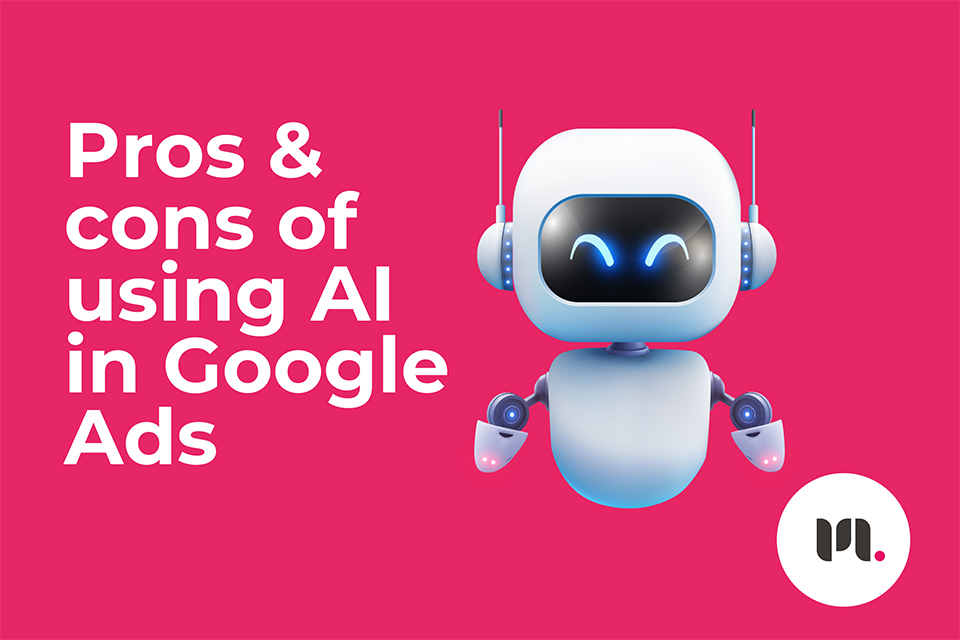Building on our previous blog discussing the pros and cons of using AI in paid social media, we now shift our focus to Google Ads. Before we do, let’s quickly explain what Google Ads are. When a user types a search into Google, there are typically ten results returned on the first page. The first three are usually paid ads. These can be spotted by the fact that they either have the word “Sponsored” above them, or an “Ad” symbol next to them. A keyword is the word or phrase the user typed in to find that particular result.
Google Ads are charged per click. What the user types in to search i.e. the keyword or phrase, is how Google charges for the ad. The more popular the keyword, the more competition and therefore the higher the cost of that keyword. e.g the phrase “social media marketing” has an average monthly search in the UK of 12,100 but to appear at the top of the page for that phrase costs £5.84. The key is to find those keywords that are most relevant to your business, but that also come at the lowest price.
This is where AI plays a role, but can it match the discernment of a human overseeing the process?
Here's a breakdown:
Advantages of Using AI for Google Ads
Time Saving – As with Facebook advertising, the automated settings are now the default in Google Ads, making it even easier to set up, especially if you’re new to pay per click (PPC) advertising. The AI version will suggest copy, headlines and imagery for the ad campaign, taking a lot of the leg work out of setting the ad up.
Automated Bidding – Smart bidding has the ability to adjust bids for keywords in real-time for better performance while staying within budget.
Targeting and Personalisation – AI can analyse user behaviour to optimise targeting, which ensures your ads reach the most relevant audience. The use of dynamic ads also personalise content based on user preference. AI helps identify high-intent audiences, predict customer behaviour, and create detailed audience segments.
Performance Prediction & Analytics – AI can predict trends and suggest budget adjustments for better long-term performance. This can help to increase conversion rates further. It also means you don’t have to monitor your ads continually. A conversion will translate as any notable actions a user takes after clicking on your ad, such as a form submission, a phone call to your business or a purchase.
A/B Testing & Optimisation – AI continuously tests different versions of ads, selecting the best-performing copy and then serving it the most. This, in turn, improves click-through rates (CTR) and reduces wasted ad spend.
Fraud Detection & Budget Control – AI can also detect click fraud and invalid traffic, preventing wasted ad spend.
So far so good. AI makes Google ads quick to set up, easy to work out which is the best copy to serve and it shows you how to spend your budget wisely, saving you time and money. However, for the sake of completeness we will also consider the drawbacks.
Disadvantages of Using AI for Google Ads
Loss of Manual Control – AI automates many aspects of the ad process, reducing direct control over bidding and placements, which can be frustrating for experienced marketeers, as objectives and keywords can veer off track into irrelevant territory.
Black Box Decisions – Google’s AI-based decisions are often a “black box,” making it hard to understand why certain changes occur. Which can make it difficult for you to troubleshoot performance issues.
Requires High-Quality Data – AI relies on accurate data; poor data can lead to incorrect targeting and wasted spend. If you are a small business or just starting out for example, then that data won’t be available, and you will still have to manually select your target audience.
Cost Implications – AI-driven campaigns might increase costs initially due to testing and learning phases. Over-reliance on automation can lead to inefficient spending if not monitored. Plus, any poorly optimised settings can lead to wasted ad spend.
Lacking the Human Touch – AI lacks the creativity and emotional intelligence needed for compelling ad copy and visuals. No one else knows what resonates with your customers better than you.
Privacy & Compliance Concerns – AI relies on user data, raising concerns about privacy regulations (e.g. GDPR). Future restrictions on tracking (e.g. cookie bans) could impact AI effectiveness.
Align with your Broader Marketing Strategy – Whilst AI can set up an individual campaign for you, it won’t be aware of your overall marketing strategy, so the campaign may not compliment your extended roadmap. Possibly more importantly, Google’s automation tools prioritise its own objectives, which may not always align with yours.
To Summarise
There is no doubt that AI can significantly enhance Google Ads performance by automating processes, improving targeting, and optimising spending. However, it requires monitoring, high-quality data, human creativity and to be mindful of how user data is handled to ensure the best results.
